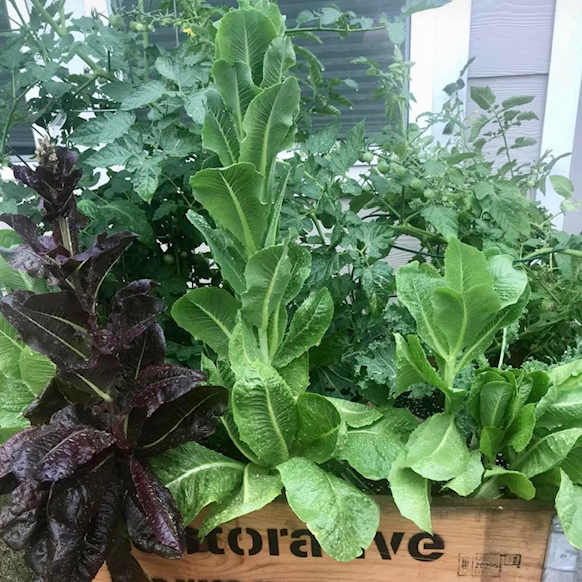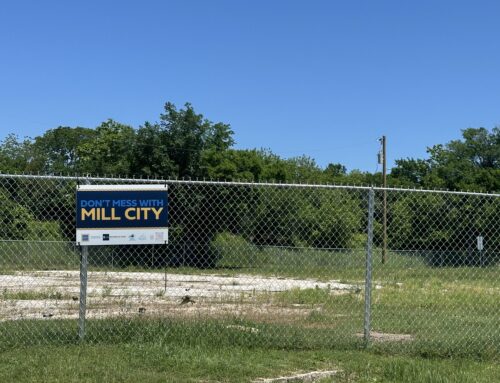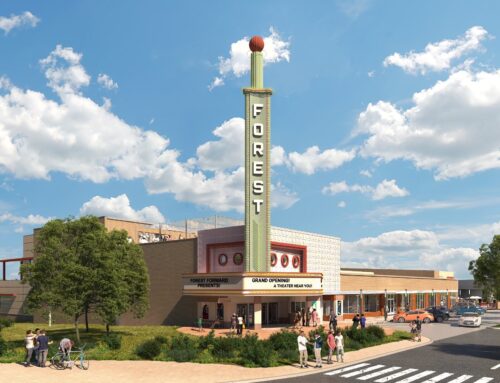Amid a pandemic, Restorative Farms plants seedlings for South Dallas growth
Co-published by our media partner, The Dallas Weekly
South Dallas resident Kaneesha Redding built her own garden box in her backyard. She went to Lowe’s, picked out the wood and nailed it together. It was her grandparents’ 20-acre farm in Louisiana that fostered her desire to garden.
“Growing up, I was used to eating corn and tomatoes from the farm, and as I grew older, I felt like I needed to get back to those basics,” Redding says. “For about the last 10 years, I’ve just been dabbling in, you know, trying to create gardens and garden spaces, growing food, because that’s what I feel like I need to get back to.”
Redding started volunteering with Restorative Farms when she learned that they sell garden boxes, or what they call “GroBoxes,” similar to the one in her own backyard. She appreciates the way the organization encourages neighbors to create their own gardens.
“Restorative Farms empowers the individual,” Redding says. “You’re able to do it in your own backyard, in the comfort of your own home, in your own space — the possibilities are unlimited. That’s what I like. I like giving people an opportunity to have some freedom.”

More than 300 of Restorative Farms’ GroBoxes are now producing basil, okra, peppers and more in backyards, front yards and patios across Dallas, including more than 50 in South Dallas. The organization shifted its focus to these portable wooden boxes in March as COVID-19 spread to the United States.
Restorative Farms had planned to work with the International Rescue Committee to start a farmers market program for entrepreneurial training. But farmers market revenue dried up when Dallas County ordered residents to shelter in place, so the organization doubled down on marketing and selling GroBoxes to stay afloat.
It worked. Stuck at home, Dallas residents had more time to tend to gardens and began buying up the GroBoxes.
“Not only were we able to stay open with the GroBoxes business,” says Owen Lynch, co-founder of Restorative Farms, “we were actually able to expand during coronavirus and hire two more farmers on to help us with the GroBox program and delivery.”

Each box costs $110 and comes with six to 10 plants. Restorative Farms dedicates 10% of GroBox revenue to provide boxes for South Dallas neighbors. So far, Lynch says, they’ve sold 257 GroBoxes and were able to give 52 back to the South Dallas community they serve.
Restorative Farms started in 2017 as an advocacy group for farming and improving urban agriculture in South Dallas. They’ve helped plant community gardens in the neighborhood, launched the Seedling Farm within the Martin Luther King Jr. Community Center’s Freedom Garden, and most recently opened the Hatcher Station Training Farm just west of the DART station.
Their focus is to combat Dallas food deserts — areas where fresh fruit, vegetables and healthy whole foods are scarce — by working with communities to grow their own food.
Redding, who not only lives in South Dallas but also teaches at St. Philip’s School, has helped deliver GroBoxes all over Dallas, including to families in her community. She believes in Restorative Farms’ mission to give her neighbors the opportunity to be self–sustaining amid a food desert, where grocery stores with fresh produce are rare.
“Nine times out of 10, you have to leave your neighborhood. You have to go to Uptown, you have to go to North Dallas to get groceries,” Redding says. “By having fresh produce right outside their bedroom door, it eliminates the need to go to other neighborhoods to find what they’re looking for.”
The ability to grab fresh veggies from the backyard instead of the grocery store convinced Hank Lawson, community engagement advisor with Frazier Revitalization, to buy a GroBox as a birthday gift for his wife.
“Because of the structure and the support they provided, they weren’t just giving us a box,” Lawson says. “They gave us a lot of help, and people are available to provide you with technical assistance as well.”
A few weeks after her birthday gift was planted, Lawson’s wife began harvesting cucumbers, tomatoes and peppers.
Frazier Revitalization is a fiscal supporter of Restorative Farms. Lawson has seen organizations come into South Dallas, use a vacant lot to create a garden and abandon the garden a year later. However, he says, Restorative Farms and their GroBoxes are different.
“The GroBox idea could have a different and long–lasting impact if there was technical support to the people who had the boxes in our neighborhood,” Lawson says. “It didn’t matter if you had a green thumb or not, as long as you get access to a staff person who will walk you through the changes and all the things that apply to taking care of the box. I was really excited about that.”
Visit restorativefarms.com to buy a GroBox, ask to be put on the GroBox donation list, or inquire about how to volunteer.






